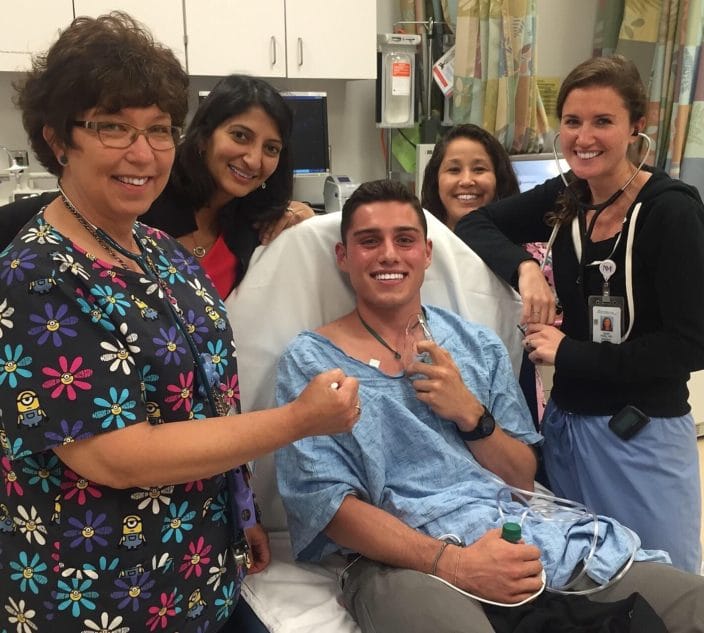
Media focus on the gluten-free fad ignores a crying need for research to understand and treat celiac disease.
You may have read an article in The Atlantic in 2017 titled, “Science Has Begun Taking Gluten Seriously.” It was a welcome piece, but what struck me was that while scientists are beginning to ask questions about gluten, they aren’t always necessarily asking the right questions – at least for those of us with celiac disease.
The Atlantic story points out a recent study with eye-catching headlines declaring that gluten does not cause heart disease. Great, except, people with celiac disease don’t follow a gluten-free diet to prevent heart disease.
For us, eating gluten causes an autoimmune response that wreaks havoc on our intestines, which in turn damages our bodies. Celiac disease can cause more than 300 symptoms, many gastrointestinal, but others that range from anemia to infertility.
The Atlantic helped to debunk the myth that a gluten-free diet is a healthier diet in general. However, there’s much more celiac disease research being done that deserves attention.
Answers We Need
The truth is there are a lot of questions we need answers to. Why do some people who are genetically at risk develop the disease and others do not? How do we increase the rate and timeliness of diagnoses? How do we make diagnosis easier?
Why do some people diagnosed with celiac disease not get better on the gluten-free diet? What questions do researchers need to be asking patients in order to make real progress toward treatment options? When will drug therapies be available to those who want to use them? And most importantly, how do we cure celiac disease?
The good news is scientists are seeking these answers. One study looking into the onset of celiac disease, the Celiac Disease Genomic Environmental Microbiome and Metabolic Study (CDGEMM), is tracking the development of the condition in babies.
CDGEMM is an extensive study of the genetic makeup, environmental conditions and gut microbiome of participating babies and children.
“Our goal is to identify how these factors contribute to disease development so that, in the future, we may be able to predict who will develop celiac disease before it happens,” the researchers explain.
Are Disease Triggers Changing?
 Alice Bast, CEO of Beyond Celiac.
Alice Bast, CEO of Beyond Celiac. Another study is following a group of 1,300 children in Colorado to get a better picture of the natural progression of celiac disease. Recent results showed that by the age of 15, slightly more than 3 percent of Denver children followed for up to 20 years had developed celiac disease, that’s a rate about three times higher than that typically cited for the overall U.S. population. These findings raise a host of other questions.
Dr. Edwin Liu, a celiac researcher at the Children’s Hospital Colorado, suggests the marked increase in celiac disease found in the study “may be a new phenomenon that has affected this current generation of youth.”
“It does beg the question as to whether or not there are new environmental triggers for celiac disease that our population faces now, compared to before,” he said, noting that it is possible there is something unique to Colorado. “But we just don’t know.”
GF Diet and Persistent Issues
For those diagnosed with celiac disease, research is revealing that the gluten-free diet is not as effective as once thought, and that many people with celiac disease do not completely heal after going gluten-free. Scientists from the Celiac Research Program at Harvard Medical School found that 19 percent of the children they studied had persistent intestinal damage even while on the gluten-free diet.
The good news is that there are currently several types of treatment in varying phases of research seeking to find additional options for patients. Combined with (and perhaps one day in place of) the gluten-free diet, these could improve the health and quality of life for celiac disease patients.
But we are still some distance away from getting a celiac disease drug approved. If you’re a person affected by celiac disease, you can help by staying abreast of the latest news and volunteering for research studies.
You can sign up for our online patient community and share your story at Go.BeyondCeliac.org to make sure your voice is heard. Beyond Celiac presents clear and relevant research news as well as an easy-to-use clinical trials finder and an interactive drug development pipeline to illustrate the progress in the field. We are also building an online community to make sure that people with celiac disease are active participants in research efforts.
It’s time that we get the answers we need and our involvement in research is the fastest route to get them.
Alice Bast is CEO of Beyond Celiac, the national organization working on behalf of the celiac patient community. Visit BeyondCeliac.org to learn more.
Read more articles by Alice Bast:
Keeping Your Costs in Line on a Gluten-Free Diet
Debunking 4 Big Celiac Myths
How to Learn from Our Mistakes – and Reduce Gluten Cross-Contact





